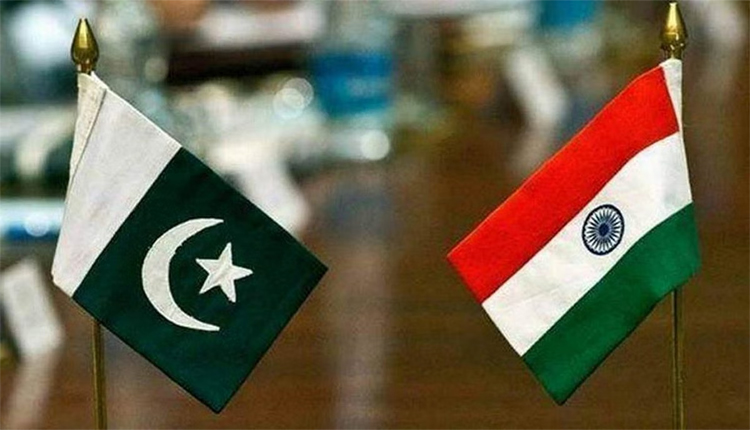New Delhi: The deadly Pahalgam terror attack of April 22 that killed 26 people, mainly composed of 25 Indians and one Nepalese, has triggered Pakistani media to start a purposeful information campaign shifting blame toward India while increasing hostile commentary against India. The attack which TRF (The Resistance Front) ascribed to LeT (Lashkar-e-Taiba) carried out in Pakistan has led India to suspend trade and downgrade its diplomatic relationship with Pakistan. The aggressive Indian media narratives described by Pakistani news outlets concern officials in New Delhi because they create rising tensions between the two neighbouring countries, both of which possess nuclear weapons.
Pakistani Media’s Narrative
After the attack, multiple Pakistani news networks and government representatives stated their nation had no involvement while charging India with using a fabricated operation to blame Pakistan for everything. Pakistani Defence Minister Khawaja Asif appeared in Dawn and The News International outlets to argue that homegrown insurgents used Hindutva policies and the suppression of minorities as their reason for violence. The official expressed a baseless claim by alleging that India funds the insurgency in Balochistan, which functions to change public perception and depict Pakistan as an aggrieved state.
The claims regarding the events in Pakistan continue to gain traction on X through various Pakistani journalists along with influential users. A portion of social media users viewed the operation as a fabricated plot by Indian intelligence that served to provide grounds for military response, and different sections accused the media of creating hatred toward Pakistan from the first moments after the incident. Pakistani commentators cited in The News International turned against Indian media because they provided “stereotypical accusations” about Pakistan even though public TRF statements identified them as the perpetrators.
Pakistani media has portrayed Indian retaliation through treaty suspension, border closures, and diplomatic dispatches as an aggressive insurgency. Editorials published in Dawn portrayed India’s responses as bullying tactics against Pakistan and described some political motives related to upcoming Indian elections. Through its official X account, which India has since withheld, the Pakistani government displayed “concern” about casualties from the attack, yet politicians in New Delhi characterised these statements as deliberately ambiguous about terrorism.
Indian Concerns Over Misinformation
Indian officials, along with their analysts, treat this media campaign as purposeful because it allows Pakistan to evade responsibility for maintaining terrorist organisations on its soil. Organisational statements from the TRF and military intelligence sections undermine Pakistan’s denial by pointing to 42 active terrorist launch pads in Pakistan-occupied Kashmir (PoK). According to Indian investigative agencies, the speech of Pakistani Army Chief General Asim Munir reportedly signalled to terrorist groups to step up their activities by expressing support for the Kashmiri “struggle” and highlighting Muslim-Hindu “stark differences.”
According to Tara Kartha from the Centre for Land Warfare Studies in New Delhi, the Pakistani media’s approach extends beyond denial since they are trying to establish their version of events. Their rejection of events as manufactured by India serves to boost LeT and generate Indo-Pakistani hostility. The security situation is projected to intensify, according to Kartha, because Pakistan currently has raised its readiness along the LoC in case of an Indian military response.
Social media platforms have become a major concern for the Indian authorities due to their ability to spread false information about events. Through their social media posts, several Pakistani profiles, which have major followings, accuse India of making false claims to divert public attention from domestic issues and potentially justify military actions. Indian cybersecurity professionals analyse emerging trends in disinformation dissemination and monitor their potential for global falsification.
India’s Response and Domestic Sentiment
Since Pakistan failed to show reasonable proof against supporting terrorist actions, India stepped up its diplomatic actions through Foreign Secretary Vikram Misri, who demanded Pakistan must prove that it will stop backing terrorism to restore normal relations between the two countries. Prime Minister Narendra Modi spoke during a political event in Bihar today to emphasise that India will prosecute those who attack its inhabitants, regardless of their hiding places. The government has scheduled a national all-party conference for April 24 to garner consensus on its strategic approach.
Indian news sources such as The Times of India and India Today presented evidence that overturns Pakistani claims about the TRF connections to LeT along with the leading role of Saifullah Kasuri. Editorials have demanded that the international community charge Pakistan due to its past support for militant organisations. The public opposition in Delhi, Mumbai, and Guwahati displays strong anti-Pakistan feelings through protests that include flag burnings coupled with calls for enhanced measures.
Regional and International Implications
Media discourse from Pakistan continues to escalate tensions between both nations, which presently stand at their worst point in history. The adopted phrase of “jingoistic” for India’s actions could signify Pakistan’s intention to build public support for possible armed conflict following its upcoming National Security Council session today. Former Pakistani minister Chaudhry Fawad Hussain sought national unity through a statement threatening action in case of a potential Indian attack.
The United States, together with Russia and Nepal, joined forces to denounce Pakistan’s attack on India while providing support to Indian interests, which rebuked Islamabad’s claims. According to X users, Pakistan’s reliance on International Monetary Fund (IMF) financial aid and Arab foreign assistance reflects a potential constraint on its capability to sustain disruptive behaviour.
The Road Ahead
The Indian government needs to fight Pakistani media propaganda regarding the Pahalgam attack while continuing their diplomatic campaign. Pakistan faces economic shutdown with the trade suspension and Indus Waters Treaty suspension because both actions demonstrate a lasting diplomatic and economic cutoff plan executed against the country. New Delhi needs to handle the danger of military escalation because nuclear capabilities exist in both countries.
Indian officials are telling people to seek information from authorised sources and refrain from sending provocative messages. A Ministry of External Affairs representative stated that “Pakistan’s media campaign exists to incite anger.” The government maintains its commitment to both justice for the victims and preventing future tragic incidents from occurring.



Comments are closed.